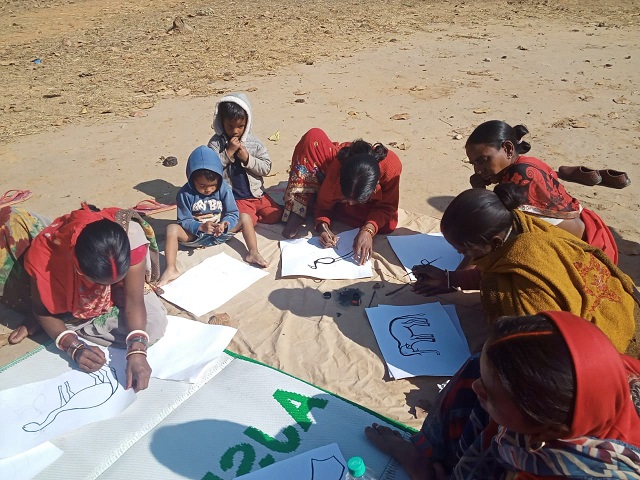
New Delhi: Under a joint initiative by the Ministry of Tribal Affairs (MoTA) and the national industry body, ASSOCHAM, around 1000 tribal artisans from all across the country would be trained under the Tribal Entrepreneurship Development Programme
The training program for the tribal master trainers under the Tribal Entrepreneurship Development Program (TEDP) initiative has begun with 20 tribal artisans getting trained in Jharkhand. These master trainers would then be training the other tribal artisans.
Launched on February 2, this is a 21-day training program at Jharkhand, where the women are learning to professionally paint Khovar and Sohrai forms of paintings.
According to one of the trainers who have been identified to provide the training programs to paint professionally explains that most of the women artisans have never held a brush in their lives, but are well versed in the techniques of painting. “These tribal artisans used to paint pictures on the mud walls of their villages. In the workshop, we assess their painting capability and ensure that the same is replicated on handmade paper and fabric. These trainers can then train other talented artisans of their villages,” he said.
The trainer also explained that once the training is complete, these artisans can upskill their talent and the products that they are developing can be displayed and sold at newer markets using digital technology.
The initiative was formulated under a three-year project agreement through which apex industry body, the Associated Chambers of Commerce and Industry of India (ASSOCHAM) would act as a Centre of Excellence for Tribal Entrepreneurship Development with the Ministry of Tribal Affairs, Government of India, to work for the upliftment of the tribal communities.
Khovar and Sohrai are well-known tribal art forms from Hazaribagh, Jharkhand and are recognized abroad as well. These are murals painted on mud walls. While Khovar is painted by married women during the marriage ceremony, Sohrai is associated with the harvest festival held on the next day of Diwali.
Women paint these murals on houses using broken combs, four fingers, used datuns (tooth sticks). The paintings are made using four natural earth colors – black (manganese), white (Kaolin), red ochre, and yellow ochre. These paintings received GI (geographical indication) tag from the Geographical Indications Registry, India in May 2020.
Of these 20 selected women artists for training, eight are from – Oraon, six are from Munda, and six are from Santhal tribes. And they belong to Dipugadha, Isco, Nano, and Lukaiya villages from Hazaribagh in Jharkhand. These villages have over 400 tribal households.
Jharkhand has a rich heritage of tribal art and abundant forest produce. The area is known for its Pitkar paintings, bamboo craft, stone craft, Dhokra craft and tribal jewelry, wooden craft, and musical instruments. The delicious and exotic produce like Rugra mushrooms, bamboo shoots, etc is popular organic products of the area. “We have begun the training program with the painting art form. Post this training program, we would also be providing training on other art forms as well,” says the trainer.
